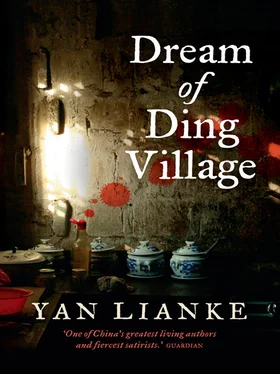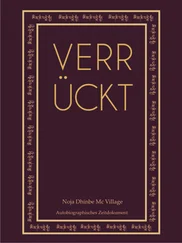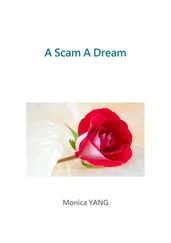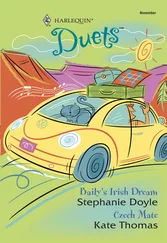My dad was a city person now, but he went out into the countryside every day, the same way that people in the countryside went out to their fields each morning. Knowing this, Grandpa went from village to village searching for my dad, until he caught up with him in Cottonwood. Ten years before, during the blood boom, Cottonwood had been a prosperous village. The tall buildings and white porcelain-tiled houses were still there, but they had become dilapidated. Grandpa stood sadly at the entrance to the village, staring at the ruin it had become. Big chunks of white tiles were missing from the walls of buildings, and what tiles remained were yellowed and weathered. The once-smooth tiles were as rough as sandpaper. Weeds sprouted between the cracks of tiled roofs and brick archways. Because of the drought, the weeds were as pale and withered as the grass that grew along the old Yellow River path.
As Grandpa walked along Cottonwood’s grand-sounding streets — Sunshine Boulevard, Harmony Avenue, Prosperity Lane and Happiness Road — he noticed that their surfaces were cracked and crumbling, littered with potholes and chunks of concrete. The houses lining the streets were exactly the same as in Ding Village: most had padlocks hanging from their metal gates, or white funeral scrolls pasted on the lintels. There were old and new scrolls with various poetic couplets, some of them poignant: ‘Grey-hairs bury their black-haired young / Saplings die, while old trees stay green.’ Others were resigned: ‘The dead are in a better place / but for the living, nothing’s changed.’ A few displayed a sense of gallows humour: ‘In hell you roast, in heaven you feast / but the food on earth is bittersweet.’ Some of the scrolls were plain white, while others had large circles where each ideograph would be. These new-style ‘blank couplets’ were made by inking the round base of a ceramic bowl, then pressing it against the paper. The vertical scrolls to the left and right of each door had seven large circles, and the horizontal scrolls above each door had four circles in a line. Everywhere Grandpa looked, the circles stared forth from doorways, like empty eyes.
Grandpa continued walking towards the centre of the village. When he came to Longevity Boulevard, he saw that the door of the social club was wide open. The place where the villagers had once watched television and played ping-pong, chess and mahjong seemed to have been abandoned. One of the door panels was missing, maybe stolen, and the other had two gaping holes. The courtyard was a shambles. It looked like a battle had taken place there. Doors and windowpanes were smashed, the dirt was littered with broken glass and piles of rubble, and the ground was overgrown with weeds. In the moist shade of the courtyard, the weeds grew tall and green, offering shelter to grasshoppers, frogs, moths and flying insects. The setting reminded Grandpa of a graveyard in an old ancestral shrine.
Further down the street, Grandpa came to an abandoned flour mill. Severed power lines hung like vines from the ceiling, and rats scampered across rows of disused machinery. The machines for grinding, milling and rolling oats had once been painted bright green, but now they were covered with a thick layer of rust.
Next to the mill was a structure that looked like it had been either a stable or a cowshed. Now that the villagers had stopped raising horses and cows, the structure was empty. Its thatched roof was gone, replaced by a weathered straw mat nailed to the wooden frame. Inside, there was a battered wooden feeding trough with a wide crack running down the centre. An old man and a little boy, probably his grandson, were playing near the trough and catching crickets.
Grandpa greeted the man like a long lost friend. ‘How’s your family? Are they well?’
‘His dad died,’ the man answered, pointing at the little boy. ‘And his mother remarried, but other than that, the family’s fine.’
Saddened by this news, Grandpa shook his head and sighed.
‘I’m looking for someone,’ Grandpa told the man, ‘and I wonder if you’ve seen him. Do you know a cadre named Ding, visiting from Wei county?’
‘Are you talking about Ding Hui, the chairman of the county task force?’ the old man asked.
‘Yes, yes, that’s him. He’s the one I’m looking for.’
‘Oh, Ding Hui is a great man, a wonderful man!’
The old man began telling Grandpa about all the wonderful things my dad had done for Cai county and for the village of Cottonwood. No matter that my dad was a Wei county cadre, he had provided low-cost coffins to the people of Cottonwood, which meant the dead had one less thing to worry about. Now he was giving solace to the living with his matchmaking service for the dead. The families of Cottonwood would never again have to worry about their unmarried relatives being lonely in the afterworld. My father had even found a match for the village idiot, a man who had sold a lot of blood while he was alive but never managed to hook a wife. Now that he was in his grave, my father had paired him with an eighteen-year-old city girl who had died in a car accident. For a dowry of only 5,000 yuan, the man’s mother was able to bury her son with a fever-free, virgin bride.
There was another village girl, a student at the best university in Beijing, who found out she had the fever, came home to Cottonwood and died a few weeks later. Although she was educated and pretty, when her parents began searching for a posthumous match, they didn’t ask for a penny of dowry money. All they wanted was to find a scholarly young man, someone who was their daughter’s intellectual equal, to keep her company in the afterworld. When a search of all the villages within a thirty-mile radius failed to turn up an appropriate match, they began to fret that they had let their daughter down. Then my dad arrived in Cottonwood with his stack of photos and files. He showed them a photo of a handsome young man who’d died of the fever while studying at a university down south. Within minutes, the two families had agreed to the match. They even held a big, fancy wedding banquet to celebrate the marriage of their dead children.
‘And it’s cheap!’ the man exclaimed. ‘The government only charges 200 yuan for each match, and it’s a huge relief for the families.’
Grandpa stared at the man for a few moments. ‘Do you know where this Ding fellow is now?’
‘Oh, sure,’ the man answered. ‘He’s doing business in Red Star Square. Just go up the street until you reach the crossroads.’
Grandpa said goodbye and continued walking along Longevity Boulevard. Ten years ago, the paved concrete boulevard had been smooth, but now its surface was cracked and pitted. There were gaping potholes filled with dirt and weeds, and dry grass sprouting from the cracks in the pavement. Even the smooth sections were covered with a thick layer of dirt, raising clouds of dust as you passed. The restaurants, food stalls, clothing shops and kiosks lining the boulevard were shuttered, their owners gone to who knows where. Longevity Boulevard, like the other streets of Cottonwood, was deserted. You rarely saw any passers-by, and when you did, they were either very young or very old. All the villagers in their thirties and forties seemed to have disappeared. The few that Grandpa saw reminded him of Jia Genzhu: skeletally thin, covered with blisters and sores, with the shadow of death on their faces.
Grandpa knew that Cottonwood had prospered during the blood boom, but like Ding Village, it had been destroyed by blood, sold into ruin. People were dying, and villages were turning into ghost towns. Pretty soon, children and old people would be the only ones left.
Читать дальше












